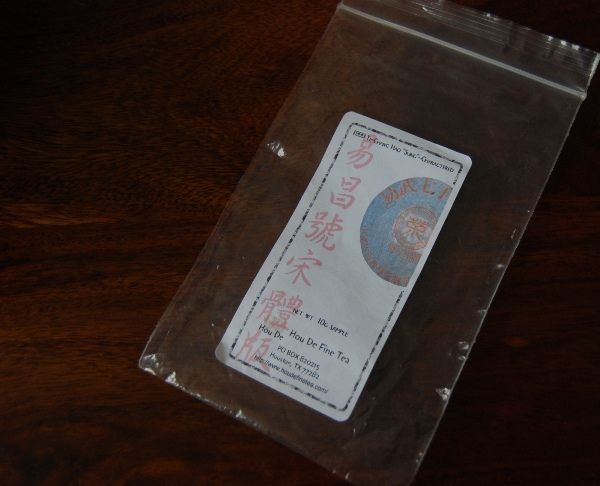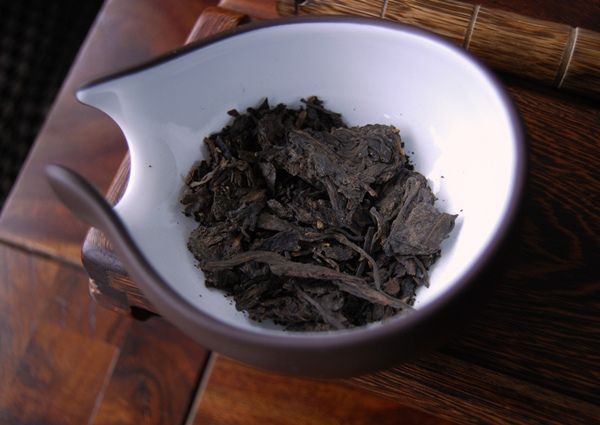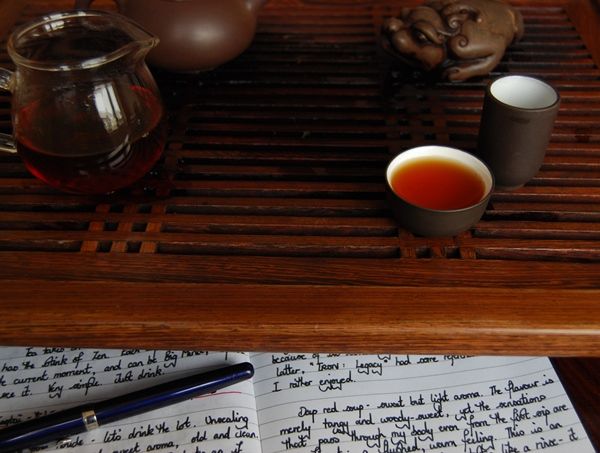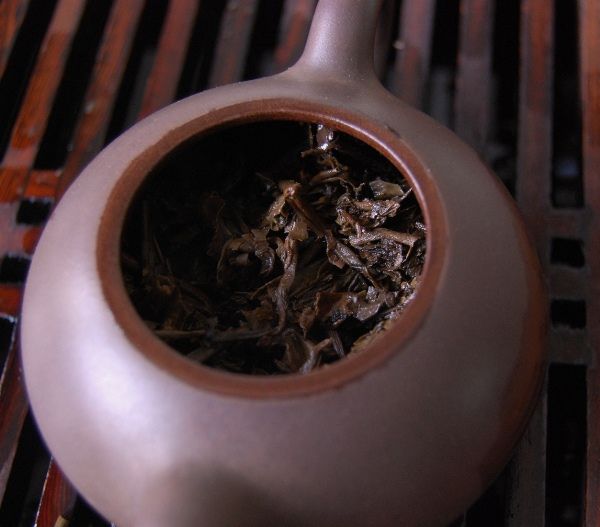This tea is called "Songtiban" [Song dynasty style/edition], which is confusing, because tea was consumed in the matcha style (whisk + powder) in that era. I'm surely missing something.
Nonetheless, this is a special cake, because it is one of Changtai's first, given that they were founded a year before its manufacture, in 1998.
Trust a Taiwanese person, in this case our dear Dr. Lee, to call the "Song" dynasty the "Sung"
I continue to ransack my most ancient and neglected samples, having bought and then never tried this sample from Houde many years ago.
Opening the sample packet releases a powerfully sweet aroma, as if I have just opened the door to a bedroom in which someone has been sleeping for years.
As shown above, my sample looks as if it has come from the middle of the cake, being a tight, hard little nugget. It seems that the cake itself has some larger leaves, but my sample is mostly fragmented.
Sitting in the air, the aroma becomes much more quiet. The colour is a charming dusty red.
This is a reticent tea. I used far too many leaves (the entire 10g sample), and it still seemed underpowered. It has a good, red soup, but the texture is thinner than one would hope for. It has a tangy, pine-like character, but it comes as if from a long distance.
Giving this tea many infusions, throughout the morning and afternoon (interrupted by a rather decent Thai sunday lunch), this tea refused to come to life.
I tried long brews, short brews, hotter water, cooler water, but eventually concluded that these leaves are a touch knackered.
The feeling in the mouth is decent, and its quiet pine vapours linger in the nose and clear the airways, but I am left with the suspicion that this tea has seen better days. Of course, being stored in an air-tight sample bag for years isn't going to help this tea to age, but I usually agree with the school of thought that says locking pu'ercha in an air-tight container (such as shrink-wrapped old cakes throughout Maliandao) merely inhibits the aging process, rather than depleting the tea of all character. If it were so, we could imagine that those classic cakes in Beijing are gradually being destroyed by their air-tight surroundings.
After twenty infusions, the tea has become slightly coloured water, and an older tea should last significantly longer than this. Whatever the route that this tea has taken to reach my tea-table, it seems to be beyond the realm of human artifice to bring it back to life.





it's Song dynasty style *characters* on the wrapper.
ReplyDeleteDear Kevin,
ReplyDeleteThanks for the reply. Aren't those characters zhuanshu, from the Zhou period? Much older than Song :)
Toodlepip,
Hobbes
"I used far too many leaves (the entire 10g sample), and it still seemed underpowered," could describe every Changtai tea I ever tasted (save the few blended by someone else and only pressed by Changtai).
ReplyDeleteSongti is the font -- specifically, the font of the characters on top (Yiwu qizi bingcha). That style is called Songti.
ReplyDeleteDear Jason,
ReplyDeleteAn interesting observation - if you haven't already, perhaps you'd like to try this Songtiban's stablemate, the 1999 Changtai Yiwu. It's really rather potent, and may change your assessment.
Dear MarshalN,
You're saying this is the "comic sans" of Chinese typography. :)
Toodlepip,
Hobbes
Comic-sans? Hell no. This is a serif font, if anything. Look at the right end of the horizontal lines.
ReplyDeleteRead this:
http://en.wikipedia.org/wiki/Ming_%28typeface%29
I mean that rather more for the stereotypical associations that "Comic Sans" has, rather than its serif status ;)
ReplyDeleteI know what you meant -- no, songti is a very well worn type that is used on everything. More like helvetica than comic sans, if anything.
ReplyDeleteI wonder if the the mild character comes from sitting in a little ziploc baggy for years?
ReplyDelete